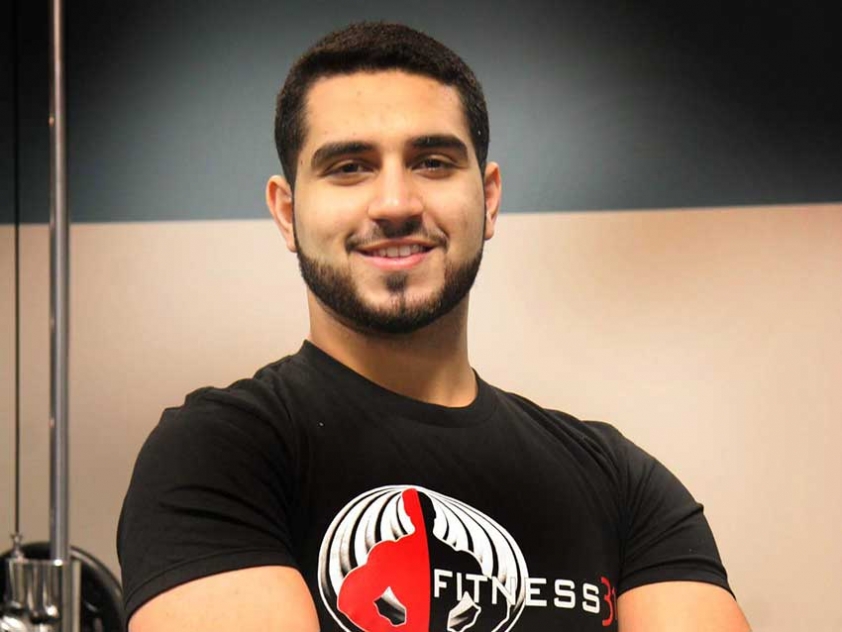 Coach Hadi is a personal trainer and the owner of Fitness 313 in Toronto.
Coach Hadi is a personal trainer and the owner of Fitness 313 in Toronto.
Jun
Advice from a Muslim Personal Trainer on Keeping Fit During Ramadan
Written by Coach HadiCoach Hadi, the owner of Fitness 313 in Toronto, offers advice to Muslims on how to keep fit while fasting this Ramadan.
*******
Every year we Muslim trainers get asked these questions:
“What do I do in Ramadan to either A. Make gains B. Avoid losing Gains or C. Lose fat.”
Before I answer these questions, I would like to start by educating people on the nature of Ramadan.
Every year, Muslims all across the globe embark on the ultimate spiritual detox for a period of one month (according to the lunar calendar); this month is widely known as the Holy Month of Ramadan. Ramaḍan is derived from the term ramad which means “the scorching heat by the sun”. According to some traditions, this name was given simply due to the nature of this month; being that which burns (or cleanses) the sins of the believers.
During this month, Muslims must fast (no food or water) from dusk until sunset. In addition, any sort of foul language, lying, or any other form of misdemeanor breaks one’s fast, thus becoming a spiritual detox as well.
The part which stumps Muslims all across the world is the sudden change in lifestyle. For some, they gain fat, others lose lean muscle mass, while others are overwhelmed with exhaustion.
I am going to give you some advice to help you make this month of Ramadan not only amazing for the soul and mind, but for your BODY as well!
In order to answer your concerns, we need to understand this topic through a number of stages:
1)Recognizing your body type
2)What you should eat according to your body type
3)Recommended supplements during Ramadan
4)When is the best time to exercise
5)The best routines for you
1) Recognizing your body type
In order to make a decision on what kind of regimen to undertake during this Holy Month, you must first understand your body type.
Some people are predisposed to gain weight much faster than others (endomorph), while others find it impossible to put on a pound of weight (ectomorph), and for some, they are born with a magnificent predisposition to eat whatever they want and still have a body which looks like it has been sculpted by the ancient Greeks to represent Hercules (mesomorph). Unfortunately, I don’t have that luxury myself.
From here on out, I will give you advice based on your body type.
2) What you should eat according to your body type
Endomorph: You are likely to gain fat in Ramadan. The nature of this month throws off your circadian rhythms (your sleep patterns) which has been shown to slow down your metabolism. In addition, you will be invited to people’s houses for breaking your fast, which means LOTS OF SWEETS. I have one word for you guys, DISCIPLINE. Take it from me, your fellow endomorph, it pays off. Limit your sugar intake to one chocolate bar (or the equivalent to it) every other day. When it comes to breaking your fast, don’t over indulge; I know you feel like you deserve it after that long fast, BUT don’t over indulge! Have the equivalency of a dinner. You can have a bit more to eat 2 hours later. Next step, eat slowly, your body takes approximately 20 minutes to realize it is full, and a lot can happen in 20 minutes... let’s just put it that way. Next tip, break your fast with a date (because it’s the Sunnah of the Prophet {SAWW}), have your tea (hopefully with very little sugar) and eat GREENS, lots of them! This will help you with many things, but to keep it short, let’s just say it makes you full faster. After eating your greens, have your meal, you deserve it. As for the meal before dusk (Suhoor, or Sahari), you can eat a bit more than what you had for breakfast (Iftaar), but again please, don’t over indulge. Stick to these habits, and you will hopefully limit your fat gain during this month!
Ectomorph: You are more prone to lose lean muscle mass. Your body will likely have a tendency to breakdown protein (lose muscle) to help replenish energy stores. I’m not going to lie, it’s going to be tough. You are going to have a lot of high quality foods to make up for this. Each one of your meals should have at least 20 grams of protein, a decent amount of carbs (40-50 grams) and some fat (15-25 grams should be good). You want to stick to food such as salmon, chicken breast, lean meat, ground beef, and tuna alongside a nice dish of your favourite salad and a good source of carbs such as brown rice, beans, pasta, etc. You should also calculate your daily recommended intake of calories if you wish to maintain your weight during Ramadan. Our trainers at Fitness 313 are fully trained to take measurements and give you estimate on how many calories you should be having a day in order to prevent weight loss. Other than that, you should be fine, it is only one month, and if you know what you are doing, you should be able to bounce back in no time once Ramadan ends.
Mesomorph: I would give you similar advice to the ectomorph; make sure you are having a decent amount of protein (20 grams) and stick to high quality foods. The only difference is to really get to know your body. Because you are in the middle of the two body types, you can go either way (slightly), see if you have a hard time gaining muscle, or tend to store fat easily, and reflect on the descriptions of the other two body types, experiment, and see what works for you. You probably will have the least heart break this month out of the other two body types.
3) Recommended supplements during Ramadan
Endomorph: Take your omega-3’s with all your meals. You may want to take some Vitamin B12 (in methyl-cobalamin form) to help boost energy levels. Having some whey protein after a workout would be ideal, if you are not a fan of protein shakes, 2 cups (500 mL) of skimmed milk will suffice. A high-quality multivitamin will also help in maintaining physiological functions. If you want recommendations on supplement brands, simply drop us an e-mail by clicking here.
Ectomorph: Take your omega-3’s with all your meals. You may want to take some Vitamin B12 (in methyl-cobalamin form) to help boost energy levels. Having some whey protein after a workout would be ideal, if you are not a fan of protein shakes, 2 cups (500 mL) of skimmed milk will suffice. A high-quality multivitamin will also help in maintaining physiological functions. My #1 TIP for you guys is to have some Casein protein shake at the end of your Suhoor meal. For those who don’t know what Casein is, it is a derivative of milk protein (much like whey) but instead of being a fast absorbing protein, it is a slow-acting, timed-release protein. This will give your body a couple more hours of protein stores to help limit protein breakdown throughout your day. If you want recommendations on supplement brands, simply drop us an e-mail by clicking here.
Mesomorph: Take your omega-3’s with all your meals. You may want to take some Vitamin B12 (in methyl-cobalamin form) to help boost energy levels. Having some whey protein after a workout would be ideal, if you are not a fan of protein shakes, 2 cups (500 mL) of skimmed milk will suffice. A high-quality multivitamin will also help in maintaining physiological functions. If you want recommendations on supplement brands, simply drop us an e-mail by clicking here.
4) When is the best time to exercise?
Alright here is the deal: ideally, you want to workout 2 hours after you break your fast. If you workout at home, you can do your workout 1 hour before you eat your suhoor, and have a nice protein-filled post workout meal right after. But typically 2 hours after breaking your fast is the best way to go; for those who hit the gym, try to find a 24/7 location for your own convenience.
5) Types of Workouts?
This goes for all body types. What you need to realize is that you should not be trying to hit personal records nor should you be in a puddle of sweat towards the end of your workout. Therefore, it is recommended that you stay away from Strength and Power training, high intensity intervals, and endurance training. Each of these workouts has a high metabolic demand, and since Ramadhan is only one month in duration, your body does not have enough time to adapt to your fasting conditions (perhaps if this was a year-round lifestyle it would be possible).
Therefore, you need to go back to the basics. Good old 3-4 sets of 10-15 repetitions at 60% of your maximal effort, 2-4 times a week. The reality is, you won’t be making substantial progress during this month. Your main goal is to limit your losses and in some cases make ‘some’ gains, not put on 10 lbs of lean mass (yes some do have that mindset). In addition, this month may not be all that tough. What many people don’t realize is that they can use this month to work on weak points. I have so many cases of clients who have muscular tightness and imbalances because of their lack of care towards their flexibility. Perhaps, this is your time to improve on your flexibility. You can take some yoga classes or watch some online yoga videos for example. You can also do your own stretching, or you can come by our gym and get some Fascial Stretch Therapy done by one of our therapists. You basically have the freedom and time to improve on your weak areas. So be honest with yourself and look for areas that need improvement.
FITNESS 313 would like to wish everyone a happy and productive Ramadan!
This article was produced exclusively for Muslim Link and should not be copied without prior permission from the site. For permission, please write to info@muslimlink.ca.












